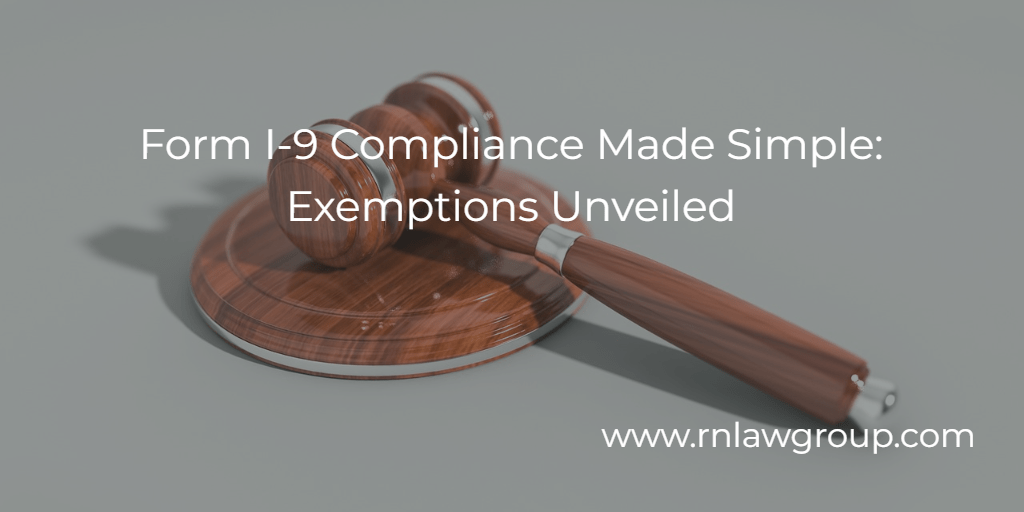
Form I-9 Compliance Made Simple: Exemptions Unveiled
Form I-9 is a critical document used by United States employers to verify the identity and work authorization of individuals hired to work. The Immigration Reform and Control Act of 1989 (IRCA) was put in place to maintain the integrity of the U.S. workforce by preventing unlawful employment, ensuring that all employees are legally authorized to work in the country.
The main purpose of Form I-9 is to establish the identity and work authorization of all employees – regardless of citizenship status. By completing Form I-9, both employers and employees are helping uphold the federal regulations prohibiting unauthorized individuals from seeking employment in the U.S.
But who must complete Form I-9? Are there any exceptions?
All employers in the United States, regardless of size or industry, must complete Form I-9 each time the employer hires any person to perform labor or services in return for wages or other remuneration. Remuneration is defined as anything of value given in exchange for labor or services; this can include food and lodging.
Newly hired employees are required to provide valid and accurate information, to the best of their knowledge, when completing Form I-9. They must also present valid documentation to establish their identity and employment eligibility. The requirement to complete Form I-9 is for every individual hired for employment in the United States, U.S. citizen or non-citizen. This includes permanent residents, foreign nationals with work visas, refugees or asylees who are authorized to work, and even those who may have temporary work permits such as DACA recipients.
Who Is Exempt From Completing Form I-9
As with everything in life, there are certain exemptions to who must complete Form I-9. These include:
- Employees hired on or before November 6, 1986 who are continuing in their employment and have a reasonable expectation of employment at all times;
- Individuals employed for casual domestic work in a private home on a sporadic, irregular, or intermittent basis;
- Independent contractors;
- Individuals employed by a contractor providing contract services (such as employee leasing or temporary agencies); and
- Employees not physically working on U.S. soil.
Before November 6, 1986
Form I-9 and the requirement to complete the form was established by the Immigration Reform and Control Act (IRCA) on November 6, 1986. Any employees who were hired before this date and are still currently employed by the same employer are not required to complete Form I-9. However, if the original company merges with another company, the completion of Form I-9 may be required.
Casual Domestic Services
Form I-9 is not required for casual domestic services. “Casual domestic services” refers to individuals who are paid to help in and around a private home, but only if the services are sporadic (meaning they occur only occasionally, singly, or in random instances), irregular (meaning the occurrence or activity lacks continuity or regularity) or intermittent (meaning they do not occur continuously but instead comes and goes at intervals). These individuals can include handymans, babysitters, or cleaning persons and as long as the services provided are sporadic, irregular, or intermittent no Form I-9 is needed. However, if the the services provided become more akin to regular employment, Form I-9 will be required.
Independent Contractors
Independent contractors are not considered employees for Form I-9 purposes are are not required to complete Form I-9. Independent contractors are individuals (or entities) who carry on an independent business, contract to do a project according to their own methods and means, and are only subject to control regarding the results of their work – not what or how it will be done. There are many different factors that to consider during the determination if an individual or entity should be considered an independent contractor:
- They are contracted to do a job according to their own means and methods.
- They supply their own materials or tools.
- Their services are offered to the general public.
- They work for a number of different clients at the same time/
- They have an opportunity for profit or loss as a result of the labor or services provided.
- They invest in facilities to do all or part of the work.
- They direct the order in which the work is to be done.
- They determine the hours during which the work is to be done.
- They are subject to control only as to results – not to what or how the work will be done.
While individuals or businesses who contract with independent contractors are not required to complete Form I-9 for the independent contractors, federal law still prohibits individuals or businesses from contracting with independent contractors if it is known that the independent contractor is not authorized to work in the United States.
Mistakenly classifying an employee as an independent contract (or the other way around) can have serious consequences. It is crucial for the worker’s relationship to the employer to be carefully assessed through an assessment of the behavioral controls, financial controls, and relationship type.
Individuals who are self-employed do not need to complete Form I-9 on their own behalf unless they are an employee of a separate business entity like a corporation or partnership. In these cases, self-employed individuals and other employees must complete Form I-9.
Temporary or Staffing Agencies
Companies or individuals who use the services of a temporary or staffing agency to obtain workers do not need to complete Form I-9 for these workers. These workers obtained through a temporary or staffing agency are employees of the agency and provide the services to the company or individual through the agency. It is the temporary or staffing agency that is required to complete Form I-9 for the individual employee they contract out. Temporary or staffing agencies are able to complete Form I-9 for its employees even if the employee has not been offered or accepted an assignment yet or there is the possibility that no actual work may arise from the arrangement.
Working Outside of the United States
Individuals who are hired by a U.S. employer but are working and located physically outside of the United States are exempt from completing Form I-9. Form I-9 must only be completed for employees who are physically on United States soil and working in the United States.
It is essential that employers and employees both are aware of the possible exemptions of who must complete Form I-9 in order to comply with the regulations established to maintain the integrity of the U.S. workforce and to ensure legal employment practices. Employers must remain diligent in the proper completion of the form and should seek legal advice when facing any uncertainty regarding Form I-9 requirements. For over 25 years, Reddy Neumann Brown PC has worked with employers to protect their businesses from the potential consequences of worksite noncompliance related to hiring and the retention of employees. Our firm guides employers to ensure full compliance with all Form I-9 requirements by conducting internal audits of a company’s records, processes, and procedures.
By: Jessica Palarca
Jessica Palarca is an attorney in Reddy Neumann Brown’s PERM Labor Certification Department where she assists clients in the beginning stages of the green card process.
Jessica earned her J.D. from the University of Houston Law Center in 2009 and was admitted into the Texas bar the same year. As the child of two immigrant parents, Jessica found her passion for immigration law early in her career. With over a decade of experience in both the private and non-profit sectors, she brings a different perspective to each case she handles. Through the years, Jessica has learned that to achieve the best possible results for each individual served, one must keep things simple and provide personalized attention and care to each case.

